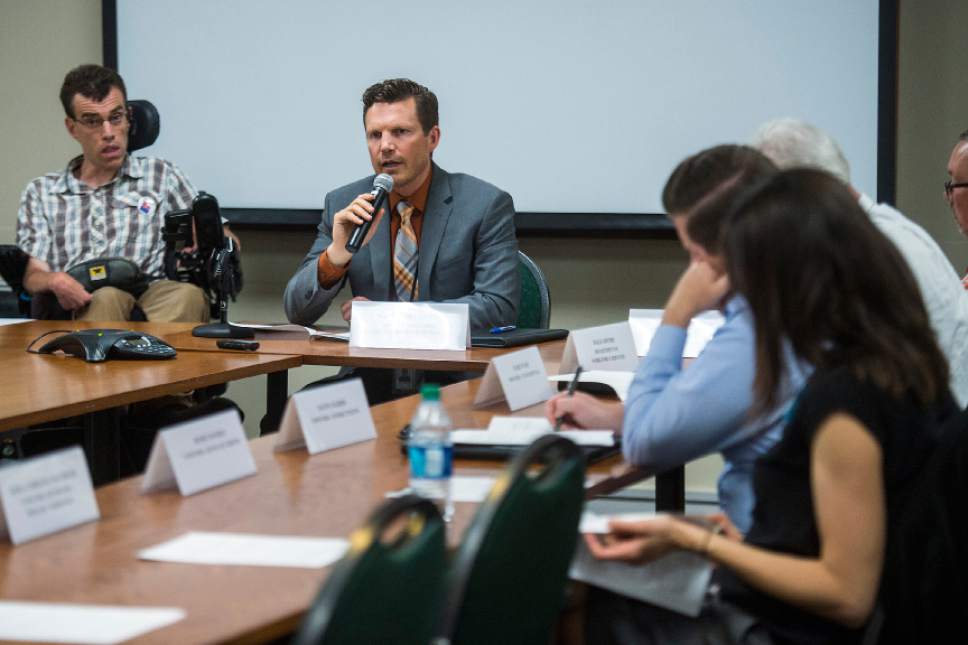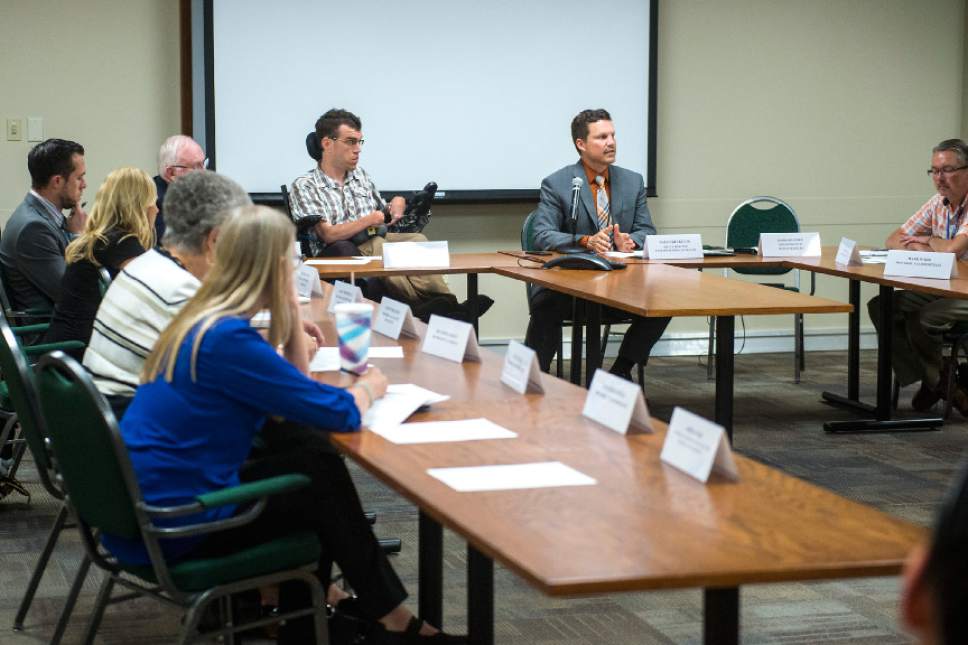This is an archived article that was published on sltrib.com in 2017, and information in the article may be outdated. It is provided only for personal research purposes and may not be reprinted.
Before Micah Vorwaller headed to a meeting Monday on the state's Medicaid expansion proposal, he picked up a woman who couldn't get there without him.
She wanted to share her thoughts on the plan, which would extend health coverage to about 6,000 of the state's most needy childless adults — those who are chronically homeless or in need of mental health or drug addiction treatment.
But Vorwaller, health policy analyst for the nonprofit Utah Health Policy Project, said public transit to the meeting — held at the state Department of Health building at 288 N. 1460 West in Salt Lake City — was inadequate.
"Without that public transportation option, which a lot of people with disabilities on Medicaid need, they might [be] prohibited" from commenting, Vorwaller said.
Location is one of several factors dampening public input at two hearings in the last month on the proposed Medicaid expansion, particularly from groups who could be most affected by the changes, health experts said. Medicaid targets low-income and disabled residents.
And, as of Monday, state officials said they had received a total of 57 comments — 21 of which were offered at Monday's public hearing — with about a week left for soliciting input.
Officials faced a similar problem with an expansion plan proposed last year, when they had received fewer than 40 comments with a week left prior to the comment deadline.
Last year's Medicaid plan still had not been approved by the federal government some six months after state officials hoped to beginning enrolling individuals Jan. 1, 2017. So, they opted to add to the proposal instead, with work requirements and other limits that had previously been nonstarters under Obama administration.
But in seeking input from Utahns, Vorwaller said department officials "should have done stuff differently."
The current meeting location created major problems for the homeless and those with disabilities, he said. Though there is a TRAX station about a third of a mile from the building, the closest stop falls outside the Utah Transit Authority's free zone, forcing would-be meeting attendees to pay their way.
And even if the meetings were held in a more central location, scheduling them in mid-afternoon — when most people are working — has also diminished attended, Vorwaller said.
"Questions have arisen about the timing of the public hearings being prohibitive to people that have other jobs to come and comment," Vorwaller said. The timing, he said, "seems to be catered to the normal people, especially with administrative agencies."
Health Department spokeswoman Kolbi Young said Utahns who cannot attend public hearings in person can either call in or submit comments online, via email or by postal mail.
Young told The Salt Lake Tribune that scheduling meetings in the middle of the day was typical for the department.
But last month, officials discussed rescheduling Monday's meeting for a time more suited for working adults after they received just three public comments.
Andrew Riggle, Medical Care Advisory Committee chairman, said at that meeting that he'd heard from "a couple folks" that "mid-afternoon times are fine for agency and organizational representatives, but might be a bit more challenging" for others.
Riggle suggested to Nate Checketts, director of the department's Medicaid and Health Financing division, that Monday's meeting be held an hour later "to make it possible for folks to come just as they are getting off of work or dropping their kids. Just a thought. Being a nonparent, I'm not sure which is better."
But Checketts opted to keep Monday's time the same, given that the news outlets had already published the dates and times.
"We do have other venues for people to submit," Checketts said late last month. "They can do it through email, through online and through the mail."
That option is not viable for many people, Vorwaller said, because they feel "intimidated" by submitting comments this way.
"It tamps down people's ability to express their point of view or tell their story," Vorwaller said. "Not everyone has that phone or access to the internet, especially where you're looking at what population is potentially effected."
Twenty-one Utahns — including two Democratic lawmakers — testified Monday at the hearing, but the vast majority of individuals who spoke represented advocacy groups.
Many of those people said Monday that the new plan was a step backward compared to the one proposed last year — even though they didn't like the plan, either.
"We believe these amendments, as proposed, are contradictory and ... undermine the goals to create services for this population," said Steve Erickson with the Crossroads Urban Center.
Idaliz Romero, 56, spoke Monday of having several recent medical problems that require extensive care, but noted she cannot afford health insurance.
Romero implored the department to find a solution to help a wide swath of the community.
"All I'm asking is if we please can look at what we're doing and if it will benefit everyone, not just a certain group, not just a certain category but everyone that needs it," she said.
The state's proposed Medicaid changes include:
• A cap on enrollees in each of the newly added categories for coverage, at 25,000.
• A 60-month lifetime limit on coverage under Medicaid and the state's Primary Care Network for those new enrollees.
• A requirement that beneficiaries of the Primary Care Network, a Utah program that offers fewer benefits than Medicaid, either work 30 or more hours per week, seek employment or participate in training unless they qualify for a half-dozen exemptions. The requirement has "the potential to be expanded" to Medicaid recipients "at a later date."
• A $25 copayment for non-emergency visits by a Medicaid beneficiary to an emergency room.
• A limit on Medicaid coverage to the first day in the month that it was applied for, as opposed to the 90-day retroactive coverage Medicaid provides current beneficiaries.
David Gessel, Utah Hospital Association's executive vice president, said Monday that first-day coverage limit would cost hospitals millions of dollars in uncompensated care.
"We don't believe this is something appropriate to put forth from our state when it was not part of the original understanding" under the initial Medicaid expansion plan, Gessel said.
Also on Monday, Shawn McMillen, executive director of First Step House, devoted to addition recovery, said the new Medicaid proposals could narrow options for people with substance use disorders. Not all of them can work at all times, McMillen said, and some could lose insurance under the plan.
"This package risks lumping a diverse group into a narrow bucket," he said.
Utahns have until July 20 to submit comments on the new Medicaid plan, which state officials will review before submitting the plan to the federal government. They expect to do so by July 31, Young said.
Health officials and lawmakers have said it's a "realistic" goal to begin enrolling targeted childless adults Jan. 1, 2018.
State officials expect to begin enrolling between 3,000 to 5,000 low-income parents in a separate, already approved plan on July 1. About 2,500 of those parents are currently on the Primary Care Network plan and have already been identified for a shift to the more comprehensive Medicaid.
Twitter @alexdstuckey —
Utah's Medicaid expansion
Public comments are being accepted for another week on Utah's latest Medicaid expansion proposal.
Comments can be submitted online at http://health.utah.gov/MedicaidExpansion/index.html or via mail to Jennifer Meyer-Smart, Utah Department of Medicaid and Health Financing, P.O. Box 143101, Salt Lake City, Utah, 84114-3101.





